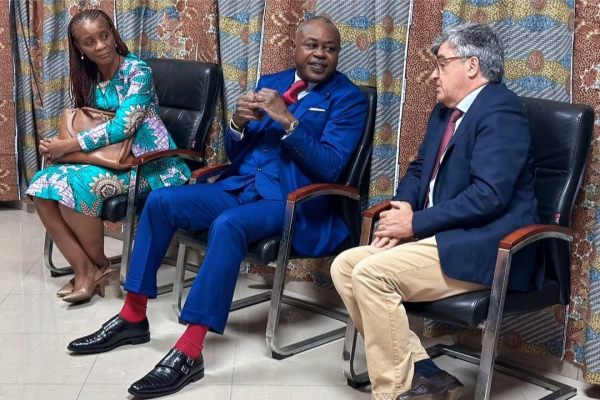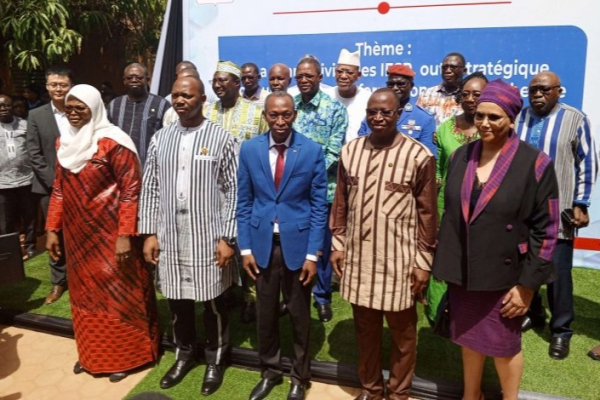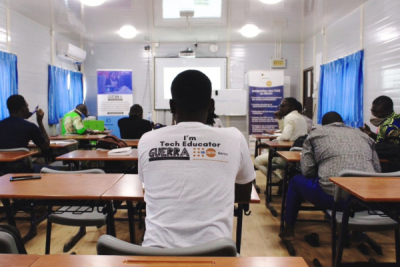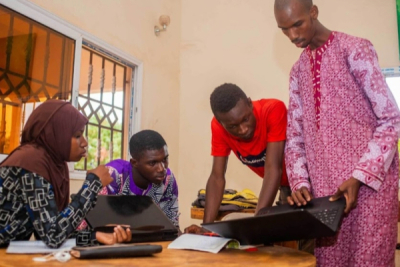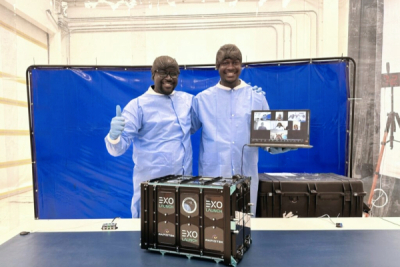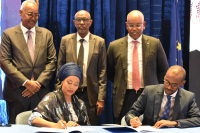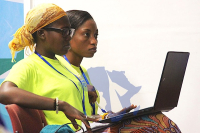The Congolese government aims to enhance its ability to provide public services tailored to the needs of the population through digital means. This initiative is a key objective of the Digital Transformation Acceleration Project.
On Friday, June 14, Léon Juste Ibombo (photo, center), Congolese Minister of Posts, Telecommunications, and Digital Economy, launched a high-speed internet connection project for public administrations nationwide. The six-month project, valued at €3.2 million (around $3.5
million), is being undertaken by Silicone Connect.
The initial phase will focus on the Ministries of Interior, Posts and Telecommunications, Health, Justice, Social Affairs, and Public Service. It involves installing Wi-Fi access points and implementing digital services.
Minister Ibombo anticipates improved connectivity for civil registry centers within the public service sector. This will strengthen the integrated civil registry system, enabling efficient synchronization and better management of civil data. "Healthcare and Justice sectors will also benefit from increased connectivity in their respective registry centers, hospitals, and courts, ensuring smooth and transparent data management" he added.
This initiative follows the deployment of high-speed internet in Congolese public universities two months prior. It aligns with the Digital Transformation Acceleration Project (PATN). PATN aims to expand high-speed internet access for underserved populations and enhance the government's ability to deliver targeted public services digitally. The World Bank is supporting the $100 million project, with an allocated budget of approximately $64 million for 2024.
By 2025, the Congolese government aims to achieve equitable access to digital services for all citizens. "As digital technology becomes a critical pillar of our development, this project aligns with the President's vision to prepare Congo for a digital, inclusive, and dynamic future the information society," Minister Ibombo declared
Isaac K. Kassouwi
The Burkinabe government aims to accelerate digital transformation and make it a cornerstone of socio-economic development. However, it must first ensure widespread Internet access across the country, including homes, government offices, hospitals, and schools.
On Friday, June 14, Burkina Faso launched high-speed internet connection for nine out of ten higher education and research institutions (HERIs). The $6.2 million project was financed by the World Bank and implemented with the technical assistance of the mobile operator Orange Burkina Faso.
"We provided the Ministry of Higher Education with IT equipment, including Wi-Fi devices installed in the nine HERIs," said Nafy Silué Coulibaly, CEO of Orange. "We also worked to connect the various buildings [174 in total, Ed.] with very high-speed fiber connectivity, and trained 29 engineers who will ensure the monitoring and maintenance of the entire system for the sustainability of the project."
The project launch follows President Ibrahim Traoré's meeting with the academic community in January 2023, which focused on the challenges plaguing the country's universities and education system. The Burkina Faso head of state instructed Adjima Thiombiano, Minister of Higher Education, Research, and Innovation, to equip the country's HERIs with high-speed internet.
According to Mr. Thiombiano, providing high-speed internet in Burkina Faso's public universities will help expand e-learning by facilitating access to online information and educational resources. It will also foster collaboration and knowledge exchange among stakeholders, improve students' digital skills, and stimulate innovation and creativity.
Furthermore, this initiative is part of the digital transformation drive in which the Burkina Faso government is engaged. The government aims to introduce digital technology in all sectors to make it an instrument of societal transformation and socio-economic development.
Isaac K. Kassouwi
As a technological center, its objective is to make digital skills accessible to everyone. Located in northern Benin, the center has already trained thousands of people.
Guerra Tech Hub, an innovative digital center located in Parakou, northern Benin, was founded in 2018 and is led by Vidjinnangni Grégory Thoto, a Beninese entrepreneur and project innovation manager who serves as its president. The hub is dedicated to creating environments that act as catalysts for building the Africa of tomorrow: disruptive, collaborative, and inclusive.
The hub boasts a community of passionate individuals, including developers, designers, and entrepreneurs. It emphasizes practical skill enhancement, collaboration, and problem-solving. Over six years, Guerra Tech Hub has designed and developed several programs, with its flagship initiative being Hack Her_. This program targets unemployed women aged 18 to 30, introducing them to digital professions, technological culture, and coding basics in cohorts of 30.
Other notable programs include Guerra Impulse, Keoubougou Pi, and ImpalaEdTech – Parakou. Guerra Impulse supports entrepreneurs in the creation and development of their business projects. This 12-month program targets early-stage entrepreneurs, selecting five startups or projects per cohort to participate.
Keoubougou Pi aims to inspire young schoolchildren in northern Benin by familiarizing them with computer science, preparing them to become digital citizens. ImpalaEdTech – Parakou seeks to cover all aspects of information and communication technologies (ICT) in education in the long term. The center promotes the teaching and use of ICT in schools and creates job opportunities for young people, especially girls, in the ICT field.
To date, Guerra Tech Hub has trained over 120 young women, more than 500 tech educators, and over 15,000 individuals in northern Benin through its programs. It has also invested over $175,000 in the Beninese tech ecosystem.
Melchior Koba
Named "astonishment" in Bambara, Mali's prevalent language, this education startup lives up to its name by fostering innovation and surprising users with its approach, particularly through its mobile application.
Kabakoo is an edtech solution developed by the Malian startup Kabakoo Academies. Founded in 2019 by Yanick Kemayou and Michèle Traoré, the Bamako-based company offers users access to online training in various fields. The goal is to equip young people with the skills to design and implement solutions tailored to the specific challenges of their communities.
To achieve this, Kabakoo operates physical campuses in several cities across the continent and has launched a mobile application available exclusively on Android. Since its inception, the app has been downloaded over 100,000 times, according to Play Store data. After downloading the app, users can create an account and access the various training programs offered on the platform.
"We connect young people, local communities, and open-minded individuals from around the world to collaboratively solve real-world problems using cutting-edge technologies and indigenous knowledge. The Kabakoo learning experience enables young Africans to acquire the skills necessary to create value by establishing businesses, finding jobs, and overcoming gender inequalities," states the startup.
Kabakoo focuses on a learner-centered curriculum, emphasizing creative project-based learning and the integration of local knowledge. The program is designed to help learners acquire and develop skills in digital fabrication and distributed manufacturing technologies. Its innovative approach has been recognized by numerous institutions, including the African Union, UNESCO, and the World Economic Forum, as a major innovation in the global education landscape.
Adoni Conrad Quenum
Cybercrime is posing a growing threat across Africa, as the continent's rapid digitalization outpaces its cybersecurity preparedness. This vulnerability exposes nations to a range of attacks, from data breaches and financial fraud to more sophisticated assaults on critical infrastructure.
The Nigerien government announced on Wednesday a new ordinance amending Law No. 2019-33 on the repression of cybercrime.
The new ordinance aims to curb the spread of disinformation and online threats , seeking to "strike a balance between freedom of expression and the protection of individual rights, while preserving public peace and security," according to the Ministry of Justice.
Promulgated earlier this month by President Abdourahamane Tiani of the National Council for the Safeguard of the Homeland in Niger, the updated legislation strengthens sanctions for online offenses. Disseminating content that disrupts public order or violates human dignity now carries a potential sentence of two to five years in prison and a fine ranging from two to five million CFA francs (approximately €3,000 to €7,600). Defamation and electronic insults can result in one to three years imprisonment and a similar fine.
Niger, like many African nations, faces a growing problem of cybercrime. During the Digital Week held from April 18 to 20, special emphasis was placed on cybersecurity. On this occasion, the Minister of Communication, Posts, and Digital Economy, Sidi Mohamed Raliou, unveiled the government's ambitions, including the establishment of a National Cybersecurity Center.
By toughening the legislation, the Nigerien government hopes to effectively combat the spread of false information, hate speech, and content inciting violence. This initiative is part of a broader strategy to enhance digital security and protect citizens from growing cyber threats.
Samira Njoya
Five years after the signing of the design protocol, Senegal’s first satellite is ready to be soon be launched into orbit.
GAINDESAT-1A, Senegal's first nanosatellite, is ready for its launch. Successfully integrated into an Exolaunch deployer in the United States, this development was revealed by the Senegalese Space Program (Sensat) on Thursday, June 13, via LinkedIn.
The 10 cm-edged nanosatellite will be launched into space in the coming days aboard a SpaceX Falcon 9 rocket. Its primary mission will be to collect data from state meteorology and water level measurement agencies, which have stations across the country.
Additionally, GAINDESAT-1A will capture satellite images of Senegal using an onboard camera. These images will serve as raw material for future developments. The satellite will take images of the country four times a day for six to seven minutes each time, over a five-year period.
This achievement is the result of a collaboration between the Senegalese government and the Space Center of the University of Montpellier (CSUM), where the satellite was designed and built by Senegalese engineers and technicians. Once in orbit, it will be monitored and controlled from Senegal, using a large control room.
With the launch of GAINDESAT-1A, Senegal will become the second Francophone sub-Saharan country, after Djibouti, to have its own satellite. In Africa, Egypt and South Africa were the first to embark on the space adventure in 1998 and 1999, respectively, followed by a dozen other countries.
Samira Njoya
Intra-African trade is confronted with numerous challenges, particularly regarding the management of goods transportation. To promote the emergence of a common market, it is urgent to identify and overcome existing barriers.
On Thursday, June 13, the Djiboutian Ministry of Infrastructure and Equipment, in collaboration with Djibouti Ports Corridor Road (DPCR) and the European Union, inaugurated a digital fleet management system named "Fleet Management System." This initiative aims to enhance the efficiency of goods transportation between Djibouti and Ethiopia, marking a crucial step for regional trade.
“This modern system will allow us to better plan, manage, and the efficient flow of goods, contributing to our vision of making Djibouti a leading logistics and economic hub in Africa,” stated Aboubaker Omar Hadi, President of the Djibouti Ports and Free Zones Authority (DPFZA).
The launch of this new system is part of a strategic partnership between the European Union and the Republic of Djibouti, supporting the implementation of the Ethiopia-Djibouti Transport Corridor Project. The European Union has invested €32 million in one of the programs aimed at promoting regional economic integration in the Horn of Africa. The objective is to reduce trade costs by 10%, transit times by 15%, and customs clearance times by 30% at certain border crossing points.
The new system, which utilizes radio-frequency identification (RFID) technology, is expected to provide complete and instantaneous control of vehicle routes and transit times along the Djibouti-Ethiopia corridor. This system will also enable all logistics stakeholders to have visibility over truck movements, optimizing logistics operations and reducing waiting times at ports.
Samira Njoya
Togo's Minister of Digital Economy and Digital Transformation launched the Nana Tech Program on Friday, aiming to equip young female entrepreneurs with the skills needed to thrive in the digital age.
The initiative will train participants in digital professions, enabling them to leverage new technologies to enhance their businesses and boost their performance.
"In line with the government’s ambitions, Nana Tech aims to identify and promote female talents in the fields of education and information technologies," said Kafui Ekouhoho, head of the Togo Digital Agency (ATD) and representative for Minister Cina Lawson, at the program's launch.
The "Nana Tech" program draws inspiration from the "Nana Benz," Togolese businesswomen who dominated the textile trade in the 1970s and 80s. "Inspired by this valuable heritage, we aim to perpetuate this culture of excellence in the digital economy by promoting Nanatech," Ekouhoho added.
The program anticipates reaching 1,500 women, empowering them to become key players in Togo's digital transformation.
Support from OMCA
This year, the program is hosted entirely within the Djanta Tech hub, with the Millennium Challenge Account Togo (OMCA-Togo) support as part of its ICT promotion program funded by the MCC's Threshold program.
"The Millennium Challenge Account Togo is honored to work with the digital sector in Togo to accelerate and implement the deep reforms initiated since the beginning of the year," stated Jeanne Ngname Bougonou, Director of OMCA, at the launch of this initiative.
Currently, Nana Tech encompasses five complementary programs:
1. Nana Tech Entrepreneurs: A six-month incubation program for female entrepreneurs, providing support with digital tools.
2. Nana Tech Immersion: An intensive six-day training focused on business management and effective use of digital tools.
3. Nana Tech Ecosystem: Roundtable discussions across the country to strengthen the female entrepreneurial ecosystem.
4. Nana Tech Lab: An online training platform.
5. Nana Tech Talents: A one-month intensive program focused on developing entrepreneurial spirit and digital skills among young startups.
Ayi Renaud Dossavi
Participation in programs like the AWS Generative AI Accelerator can help African startups gain visibility on a global scale, attracting investors and partners, and ultimately driving economic growth and technological advancement in the region.
Amazon Web Services (AWS) has unveiled a $230 million investment to boost generative AI startups globally, AWS announced June 13. The move aims to accelerate innovative AI applications across sectors, supporting startups with AWS credits, mentorship, and resources.
"We'll assist startups in launching and scaling businesses, unleashing new AI applications," said Matt Wood, VP of AI Products at AWS.
The AWS Generative AI Accelerator, a 10-week program, will onboard 80 startups, offering hands-on expertise, mentorship, and up to $1 million in credits each. Applications are open until July 19.
Selected startups gain access to AWS compute, storage, and AI chips like AWS Trainium and AWS Inferentia2, plus Amazon SageMaker.
AWS's dominant 41.5% share of the cloud computing market underscores its significant influence. This level of control suggests that initiatives like the AWS Generative AI Accelerator can shape global AI innovation, including emerging markets like Africa.
Hikmatu Bilali
On a mission to revolutionize how organizations access talent, he leverages his expertise in artificial intelligence (AI) and technology to transform the talent acquisition landscape fundamentally.
Amine Khayatei Houssaini (photo) is a Moroccan tech entrepreneur, founder, and CEO of Kwiks. He aims to establish Africa's first marketplace for independent headhunters.
Founded in Morocco in 2014, Kwiks initially focused on providing quick CV delivery to French companies. Today, Kwiks has evolved into a digital recruitment platform dedicated to businesses, supported by a community of independent recruitment experts across Africa. Leveraging artificial intelligence, the platform offers an efficient recruitment process with real-time performance visibility.
Kwiks' mission is to democratize access to headhunting services for SMEs worldwide. The platform reduces recruitment costs and optimizes post-integration talent tracking. To date, Kwiks boasts over 450 specialized recruiters in various fields.
Beyond his work at Kwiks, Amine Khayatei Houssaini is also the founder and managing partner of Pronatlas. Launched in France during Euro 2016, Pronatlas offers companies an online platform for sports betting among colleagues. As a freelance NoCode consultant, he uses his skills to implement automated processes using NoCode tools.
Amine holds an engineering degree in MIAGE (computer methods applied to business management), with a specialization in information systems audit, obtained in 2008 from the University of Bordeaux. His professional career began that same year at ALTEN, an IT company, where he served as a project manager.
In 2011, he joined the consulting firm AdWay Conseil, working until 2013 in roles ranging from management consultant to business manager. In 2018, he became a member of the start-up commission of the General Confederation of Moroccan Enterprises (CGEM).
In 2019, Amine was appointed business partner for the Moroccan branch of BABEL, a Spanish technology multinational. Between 2020 and 2022, he served on the board of the Moroccan Federation of Information Technology, Telecommunications, and Offshoring (Apebi).
Melchior Koba
More...
African countries are experiencing a substantial lag in digital development, a situation attributed to various factors. Effectively addressing these delays requires a clear understanding of these underlying issues.
Niger's Minister of Communication, Posts, and Digital Economy, Sidi Mohamed Raliou, officially launched the Digital Economy Diagnostic of Niger (Niger DE4A) on Wednesday, June 12th, in Niamey.
This initiative aims to comprehensively assess the current state of digital services penetration and usage within the country. "The evaluation will provide policymakers with actionable and prioritized recommendations to accelerate the digital transformation of Niger's government and its socio-economic landscape," emphasized the Ministry of Digital Economy.
The program, supported by the World Bank, aligns with broader efforts to assist African nations in implementing the African Union's Digital Transformation Strategy. This strategy seeks to equip every individual, business, and government body on the continent with the necessary digital skills by 2030, ultimately contributing to lifting Africa out of underdevelopment.
The digital economy diagnostic will unfold in three key phases. The first phase involves consultations with relevant stakeholders to gather essential data. This will be followed by the development of a detailed report outlining current challenges and opportunities in Niger's digital landscape. Finally, the program will propose concrete strategies and measures to maximize the country's potential for digital development.
The overall goal of the assessment is to identify and address obstacles hindering Niger's digital progress. Key challenges include insufficient technological infrastructure, limited digital skills among the population, and restrictive regulations. Overcoming these hurdles will not only enhance government efficiency but also stimulate innovation and drive economic growth in Niger.
Samira Njoya
The tailored solution was developed by two tech entrepreneurs to support farmers, particularly smallholder farmers.
FarmHouse is an agritech solution developed by the Zambian startup eMsika. It allows users to purchase agricultural products and seek farming advice from an AI-based chatbot. The startup, based in Lusaka, was founded in 2016 by Gilbert Mwale and Elton Chirwa. On Thursday, June 13, Gilbert Mwale announced the company's plans to expand into Tanzania, Nigeria, Egypt, and Zimbabwe.
The solution features a mobile application available on iOS and Android, which has already been downloaded over a thousand times, according to Play Store statistics. After downloading the app, users create an account to access the various services offered by the startup. FarmHouse focuses on providing technical advice on farms and selling quality agricultural inputs for the needs of small poultry and livestock farmers in urban areas.
“Using FarmHouse, farmers can access training, inputs, and connections with other farmers, while eMsika recently launched a farmer membership programme called Farmhouse Plus. It has also set up a physical store, and partnered with multinational suppliers,” Gilbert Mwale told Disrupt Africa.
The startup offers subscriptions, with the most affordable priced at 149 Zambian kwachas (approximately $5.64), granting access to several services. This subscription model, along with the profit margin from the sale of various agricultural products, generates revenue for FarmHouse. The company claims to have trained around 8,000 farmers through its training programs.
Adoni Conrad Quenum
A seasoned financial analyst, he honed his skills at investment banks and technology firms. Now, as an entrepreneur, he's leveraging technology to disrupt the financial landscape in Egypt, making investment opportunities more accessible for the everyday Egyptian.
Ahmad Hammouda (photo) is an Egyptian entrepreneur specializing in financial technology. He is one of the co-founders and the CEO of Thndr, a digital investment platform designed to simplify investing in the MENA (Middle East and North Africa) region.
Founded in 2020, Thndr aims to democratize access to the tools and resources needed to achieve financial freedom. With a brokerage license from the Egyptian Financial Regulatory Authority (FRA), the company offers securities brokerage services.
“The idea for Thndr began in 2016 while I was advising on the sale of a bank. I realized how inaccessible financial products were to the general population. That's when I decided to make investing accessible to everyone my life's mission,” said Ahmad Hammouda in 2020.
To support its over 3 million users, the company launched Thndr Learn, an educational platform that teaches everything one needs to know about money management. Thndr also offers Thndr Claps, a daily newsletter that delivers easy-to-understand financial news to users' inboxes.
Ahmad Hammouda graduated from the American University in Cairo in 2009 with a bachelor's degree in finance and economics. He also holds a Chartered Financial Analyst (CFA) designation, obtained in 2011 from the CFA Institute.
His career began in 2009 at Ernst & Young Egypt, an audit, advisory, tax, and legal services firm, where he was an intern. He then became a consultant at The Advisors, a financial and management consulting firm. In 2012, he joined Pharos Holding for Financial Investments as an investment banking analyst.
In 2013, he became vice president at CI Capital Financial Group. In 2017, he was hired by Uber in Egypt, where he held successive roles as Director of Operations and Logistics and General Manager.
Melchior Koba
She aims to assist businesses and financial institutions in achieving their goals. She offers smart, data-driven solutions to support them in their decision-making processes.
Tebogo Mokwena (photo) is a South African entrepreneur and technology enthusiast. Co-founder of Akiba Digital in 2018, she has led the startup since 2020, helping financial institutions make better decisions.
Akiba Digital is a financial platform that leverages artificial intelligence and data to democratize access to financial opportunities. The company enables small and medium-sized enterprises, as well as consumers, to achieve their financial goals.
The company aims to "credit more accessible to customers who have been previously excluded by the credit bureaus and credit invisible for a long time, including small business & customers who are either unbanked or underbanked," explained Tebogo Mokwena in 2023.
As a data aggregator, Akiba Digital helps financial institutions create unique profiles of their clients to enhance decision-making. With advanced data analysis and risk assessment tools, the company automates client verification processes. This allows financial service providers to detect and mitigate fraudulent activities, protecting both their operations and their clients.
Before Akiba Digital, Tebogo Mokwena founded Pach-it in 2014, a women-led web and mobile development startup. Their first product, Funda Nathi, is an educational app aimed at helping disadvantaged South African students achieve their academic potential.
The entrepreneur is a graduate of the University of California, Los Angeles (UCLA), where she earned a bachelor's degree in genetics in 2014. In 2015, she received a bachelor's degree in computer science, genetics, and biochemistry after three years of study at the University of Cape Town. She also holds a master's degree in machine learning, obtained in 2019 from the University of Lugano.
Between 2014 and 2017, Tebogo Mokwena served as president of World Merit, a community for global change-makers. In 2015, she was associated with iXperience, a South African tech company, and in 2016, she worked as a software developer at Allan Gray Proprietary, a private investment management firm. From 2016 to 2017, she worked as a digital consultant for McKinsey & Company.
Melchior Koba


